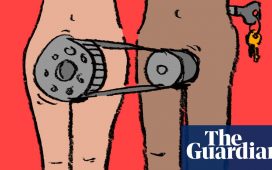Nothing is quite as shattering as a broken heart. A bad breakup has been known to trigger a range of psychological and physical symptoms, from nausea and insomnia to clinical depression. In more extreme scenarios, broken heart syndrome – when a person’s heart stops pumping blood properly after an emotional shock – can lead to death.
Fortunately, recent breakthroughs suggest we may soon be able to beat it. In March, a Spanish study found propofol, a sedative used for anaesthesia, may also be able to mute the painful memories that come with heartbreak. Participants were injected with the drug immediately after recalling a distressing story and, when asked to recount it again 24 hours later, they found the memory to be less vivid.
The principal goal of the research was to relieve the symptoms of post-traumatic stress disorder (PTSD), but it seems there may be scope for the drug to be used to suppress other upsetting memories. An unexpected loss such as heartbreak can also be traumatic, and some people report similar symptoms.
Dr Bryan Strange, who led the study, says: “Combining anaesthesia with evoking an emotionally charged memory impairs its subsequent recall. We will need to derive a set of criteria that identify people for whom it works well, and where the benefit justifies the risk of anaesthesia. There may well be those for whom heartbreak is so distressing that the criteria is fulfilled.”
In the past year, a wave of apps such as Mend, Rx Breakup and Break-Up Boss have been released, promising guidance, advice and distracting activities to help soothe the pain of heartbreak. It is a lofty promise, but one that appears to be rooted in logic: a study in 2017 found similar brain-training style exercises could help curb embarrassing or impulsive post-breakup behaviour and strengthen self-control.
Helen Fisher is a biological anthropologist who has spent more than four decades studying the effects of love on the human brain. Her research, using functional MRI scans, has identified striking similarities between losing a loved one and breaking an addiction.
“With heartbreak, no one gets out alive,” she says. “After studying people who were rejected in love, we found activity in the brain regions associated with craving and obsession, as well as in the nucleus accumbens, the main factory of addictions like gambling and substance abuse.
“We also found activity in the region associated with physical pain, and anxiety that goes along with physical pain. It is a very powerful brain response.”
Fisher’s findings are echoed by Barbara Sahakian, a professor of clinical neuropsychology at the University of Cambridge. She recently launched Decoder, a brain-training app that claims to effectively distract the lovelorn and improve concentration skills.
“Love is very addictive,” Sahakian says. “It’s like your reward system is activated by that person. If they leave you, you have to get rid of that habitual, compulsive need to see them, text them and hear their voice … The best way to do that is through distraction and using your time in other ways.”
Other, more controversial treatments are on offer, such as eye movement desensitisation and reprocessing (EMDR) and neurofeedback. The latter was praised by the rapper Dessa last year, who tried the therapy after stumbling across Fisher’s research online.
“Knowing that there was a reliable signature of brain activity associated with romantic love made me question whether there were ways to change,” says Dessa, who had been struggling to cut the cord on an on-and-off relationship lasting 14 years with a man she refers to as X.
The aim of neurofeedback is to “retrain” brain waves and minimise unwanted activity through electroencephalography. Subjects wear a cap of electrical wires that tracks brainwaves and translates them into audio or visual cues. Although the treatment is still seen as experimental in the science community, early, small-scale tests have suggested it may alleviate symptoms of depression, as well as ADHD and PTSD.
Dessa tried the treatment for nine sessions to see if it could stop her romantic obsession. The results, she says, were positive. “I felt less compelled and fixated,” she says. “When I saw X again, I didn’t have the same surge of adrenaline.”
She is quick to add that a larger sample size would be needed to monitor other variables that could be responsible for the result. “Maybe it was just a placebo, but I did notice a change,” Dessa says.
Retraining your brain with electrical wires is not for everyone. Brian Earp, a researcher in psychology, philosophy and ethics at the University of Oxford, believes a more straightforward chemical intervention – or “anti-love biotechnology” – will soon be readily available for people struggling with the loss of a partner.
“The scary thing is that anti-love biotechnology is already here,” he says. “It’s happening as a side-effect of currently used medications, but western medicine tends not to systematically study the interpersonal effects of common drugs, so we have little idea of the true scope of the problem.
“But based on numerous case reports backed up by pharmacological and neuroscientific research, selective serotonin reuptake inhibitors [SSRIs, a common type of antidepressant] can sometimes have a ‘blunting’ effect on people’s ability to care about the feelings of others – including their romantic partners.”
Earp stresses that SSRIs can often be helpful for a relationship if depression has been causing problems between a couple. But it seems they may also help with muting the depression that can follow a failed one.
Both Earp and Fisher are quick to point out the ethical problems of actual anti-love biotechnology. If a cure for heartbreak were to be marketed and developed – which they believe is one day likely – there are concerns about how it would be used, and by whom. “Might drugs one day be used to intentionally sever a romantic bond?” asks Earp. “We would need to agree on an ethical framework for handling such cases.”
As well as this, any tampering with emotional memory could cause further complications. We often learn from our mistakes; what good is it if we just block them out?
“Many of our unpleasant memories have helped us, as individuals and as a society, to adjust our future behaviour accordingly,” says Strange. However, he adds, treatments such as propofol should be “relatively straightforward to implement” if a clear benefit can be demonstrated, which means “a real-world clinical treatment should not be too far away”.
Fisher, meanwhile, is adamant the best approach is a simple one: follow the addiction model.
“Throw out the cards and letters: stuff them in a box, put them in the attic,” she says. “Don’t write, don’t call, get some exercise – it increases dopamine and resistance to pain. Cut out sugar. Don’t try to make friends with your ex-partner, at least not until you’re over it. You just have to go out with new people and keep moving.
“No drugs can help one build new social connections and daily routines. The pain of rejection is too great, and too primordial. It had a real function for millions of years. In my opinion, only time – or a new lover – can truly heal you.”














